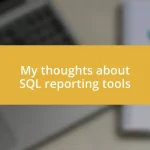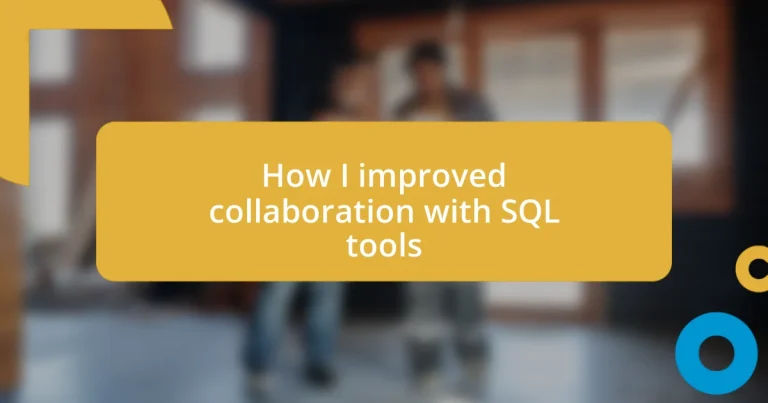Key takeaways:
- SQL tools enhance collaboration by centralizing data management, streamlining communication, and automating repetitive tasks, leading to improved productivity.
- Choosing the right SQL tools involves evaluating user-friendliness, integration capabilities, performance, support systems, and overall value, with team involvement in the selection process being crucial.
- Establishing clear roles, regular check-ins, and celebrating small wins fosters effective collaborative workflows, while ongoing training and feedback loops promote continuous improvement and shared learning among team members.
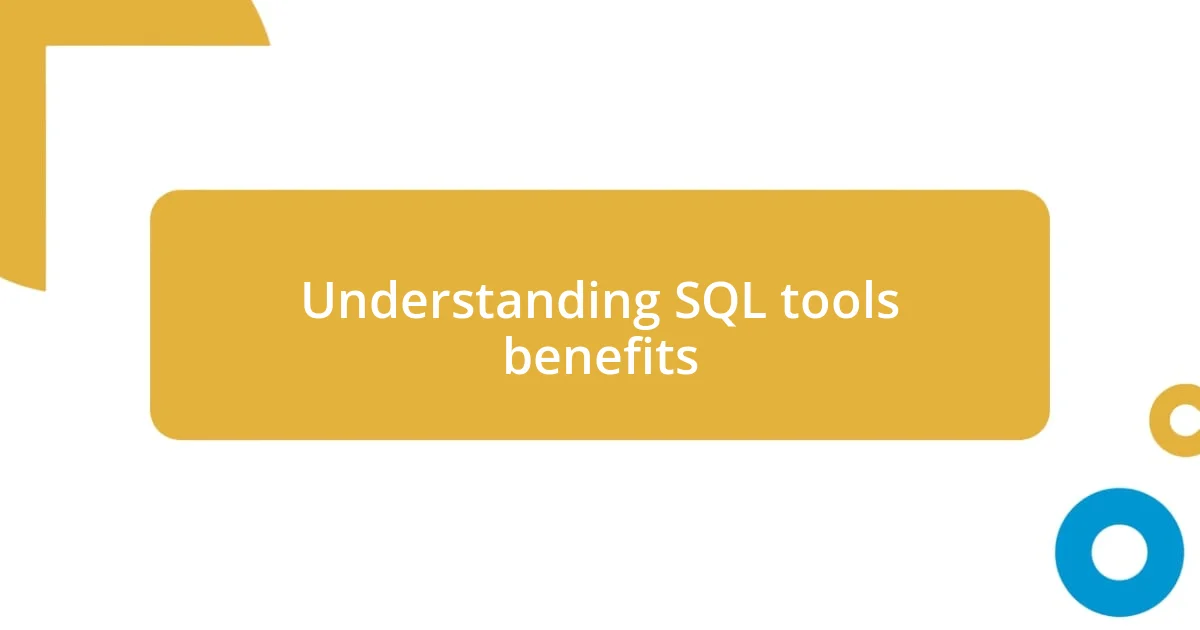
Understanding SQL tools benefits
SQL tools offer a myriad of benefits that can significantly enhance collaboration within teams. For instance, I remember a project where our team struggled with data discrepancies. After adopting a robust SQL tool, we were able to centralize our data management and easily share insights, which transformed our workflow and reduced misunderstandings. Isn’t it fascinating how a single tool can change the dynamics of teamwork?
One major advantage of using SQL tools is their ability to streamline communication. I often find that visualizing data queries can spark discussions among colleagues who might not typically engage with numbers. The clarity these tools provide leads to more informed decision-making and, dare I say, a stronger sense of camaraderie. Have you experienced moments where a shared understanding of data has brought your team closer together?
Moreover, SQL tools enhance efficiency by automating repetitive tasks that would otherwise take up valuable time. For example, automating reports used to consume hours of my week, but now, with SQL tools in place, those hours are saved for more strategic brainstorming sessions. This not only boosts productivity but also encourages team members to focus on innovation rather than getting bogged down by tedious processes. How much more could your team accomplish if you could reclaim that time?
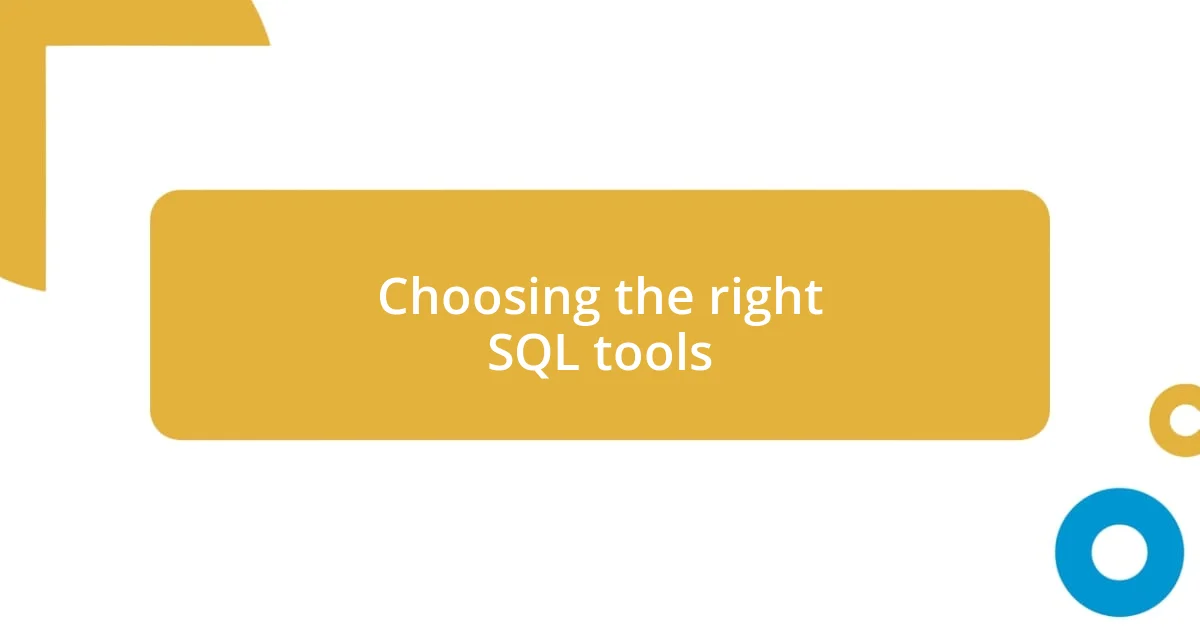
Choosing the right SQL tools
Selecting the right SQL tools can feel overwhelming, given the multitude of options available. I’ve been in situations where the wrong choice led to frustration and wasted time. When exploring SQL tools, it’s crucial to consider not only the features but also how they fit into your team’s workflow and objectives. A tool that feels like a perfect match to one team may be cumbersome for another. It’s all about finding that sweet spot.
Here are some key considerations to keep in mind while choosing SQL tools:
- User-Friendliness: Opt for interfaces that even non-technical team members can navigate comfortably.
- Integration Capabilities: Ensure the tool works seamlessly with your existing systems and other software.
- Performance and Scalability: Choose tools that can handle your current data volume and can grow as your needs increase.
- Support and Community: A strong support system and user community can significantly enhance your experience and reduce learning curves.
- Cost vs. Value: While budget is important, weigh the potential benefits against the costs to determine the real value.
In my experience, involving the entire team in the decision-making process can also elevate the outcome. I vividly recall a scenario where I gathered feedback from colleagues before transitioning to a new SQL tool. Their insights helped us choose an option that not only solved our pain points but also felt intuitive for everyone. This collaborative approach fostered a sense of ownership and excitement about the upcoming changes.
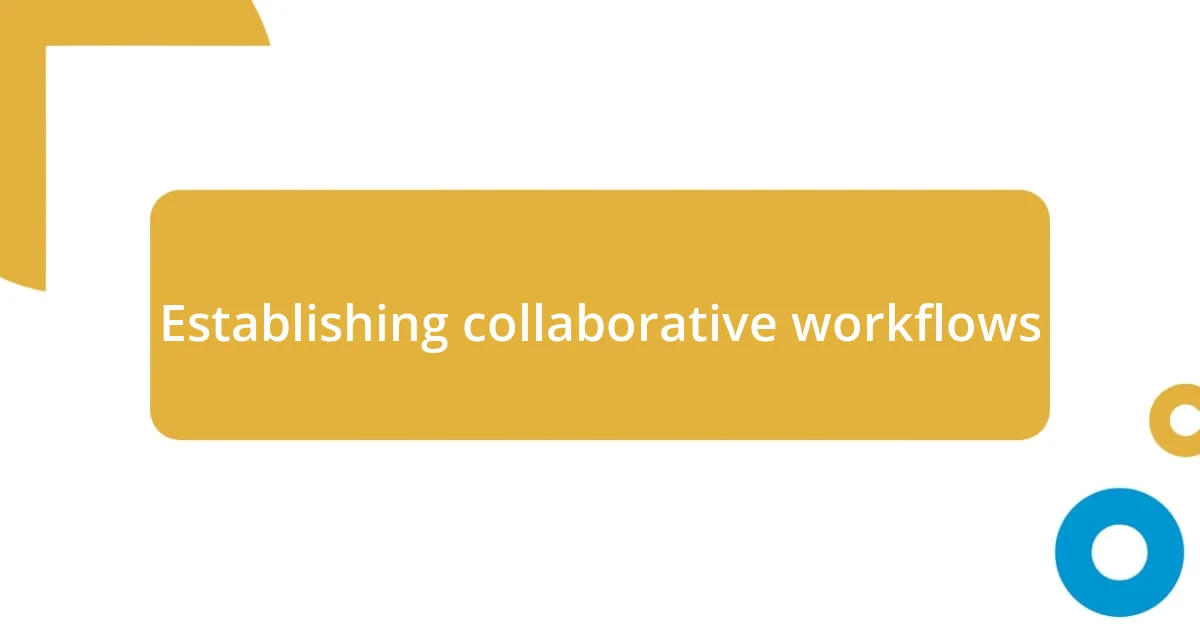
Establishing collaborative workflows
Establishing effective collaborative workflows is pivotal for leveraging SQL tools. In my experience, creating a clear outline of roles and responsibilities helps everyone understand their contributions. During a significant project, I introduced a shared document that outlined specific tasks related to our SQL queries and data management. This clarity resulted in fewer overlaps and a more organized approach, ultimately fostering smoother collaboration.
Another critical aspect is regular check-ins to discuss progress and challenges. I fondly recall weekly meetings where our team gathered to review our SQL outputs. These sessions not only pinpointed potential issues early but also opened the floor for innovative ideas on data manipulation. Such engagement kept everyone in the loop and transformed our teamwork into an interactive dialogue rather than a series of isolated tasks.
Lastly, I believe in celebrating small wins. Recognizing team accomplishments, like successfully executing a complex SQL query or resolving a data inconsistency, can significantly uplift morale. I once initiated a small celebration for a team member who optimized our reporting process, which encouraged others to experiment and innovate. It’s these little moments of recognition that solidify collaboration within the team.
| Method | Benefits |
|---|---|
| Outline of Roles | Enhanced clarity and reduced overlaps |
| Regular Check-ins | Facilitated open communication and problem-solving |
| Celebrate Wins | Boosted morale and encouraged innovation |
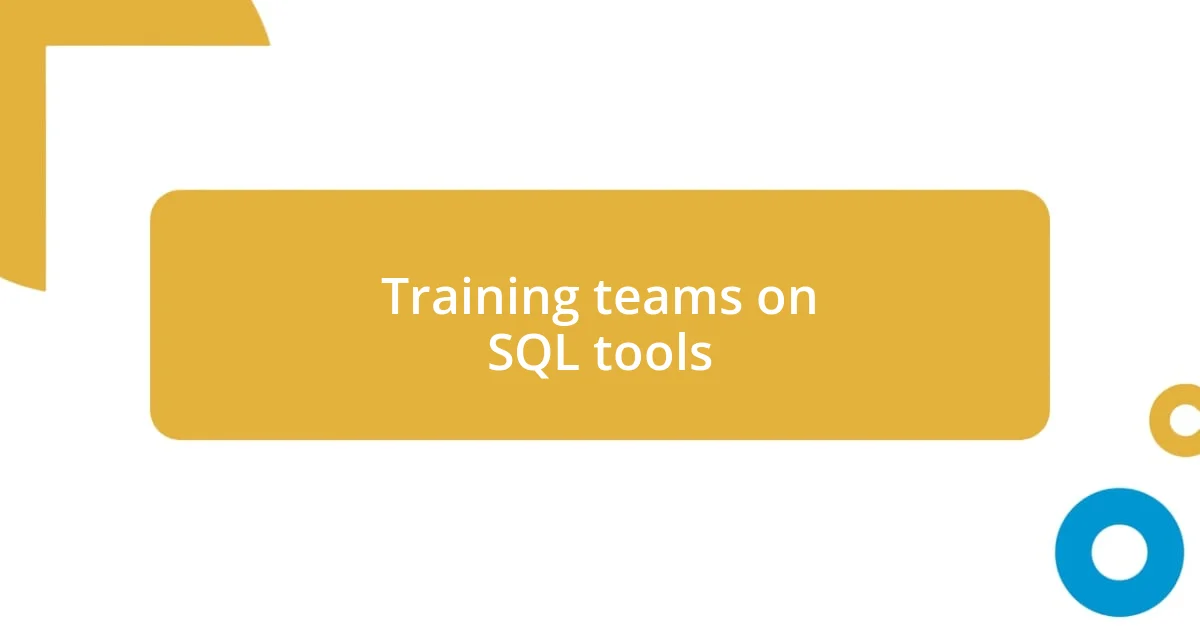
Training teams on SQL tools
Training teams on SQL tools is all about building confidence and competence. I remember the first training session I conducted; I walked into the room filled with nerves, unsure of how my team would respond to learning a new tool. To my surprise, we transformed those initial moments of uncertainty into an engaging hands-on experience. By breaking down each feature into bite-sized pieces and relating them to real work scenarios, I saw my colleagues not just understand, but also genuinely enjoy the learning process.
Interactive training sessions can be game-changers, allowing team members to practice in a supportive environment. I often include real-life challenges my team has faced, prompting discussions about how our new SQL tool can offer solutions. This approach not only makes learning relevant but also inspires team members to think critically about the tool’s application in their daily tasks. For instance, during one workshop, we collaboratively tackled a data retrieval problem, and the moment one of my colleagues solved it using our new SQL tool was electrifying! Their enthusiasm was infectious, proving how powerful shared learning can be.
Additionally, I’ve found that ongoing training and refreshers are vital. After the initial sessions, I like to schedule monthly follow-ups, which not only reinforce what we’ve learned but also foster a supportive environment for asking new questions that arise. During one such session, a teammate shared their innovative way of using SQL for reporting—something I hadn’t even considered! This open exchange not only deepened our collaboration but also cultivated a culture where we continuously learn from one another. Isn’t it amazing how shared knowledge can enhance team dynamics?
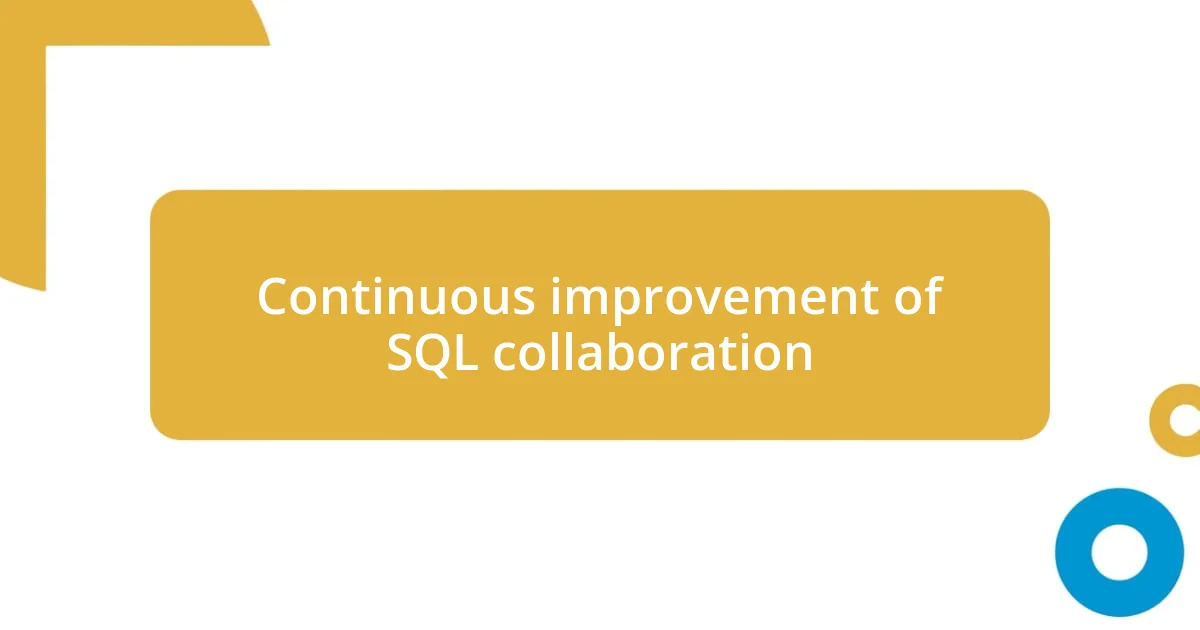
Continuous improvement of SQL collaboration
Continuous improvement in SQL collaboration is something I genuinely believe can be enhanced through consistent feedback loops. After implementing a new SQL tool, I initiated anonymous surveys to gather team insights about its usability. The responses were enlightening—some team members pointed out features that were initially overlooked, while others shared pain points that weren’t obvious to me. It was a humbling experience that emphasized the necessity of listening to your team; sometimes, the best improvements come from those on the front lines.
I also discovered the power of mentorship in advancing our SQL collaboration. I paired more experienced team members with those who were still finding their way. I’ll always remember a moment where a mentor sat down with a novice, and their conversation not only clarified a complex query but also sparked a new SQL strategy for our upcoming project. That moment truly showcased how collaboration can breed innovation—two minds working together can often achieve solutions that would take much longer individually. Isn’t it fascinating how much we can learn from each other when we foster an environment of support?
Lastly, I found that creating a shared repository of SQL queries and solutions can be a game-changer for ongoing improvement. Once, while navigating a particularly tedious reporting task, I stumbled upon a treasure trove of clever queries that my colleagues had previously built. It felt like discovering a secret weapon! Sharing these in a collaborative space, where everyone could contribute and learn, transformed how we tackled repeated tasks. It created a sense of ownership and pride over our collective knowledge. So, I ask you: how can shared resources elevate your team’s collaboration efforts in SQL?









